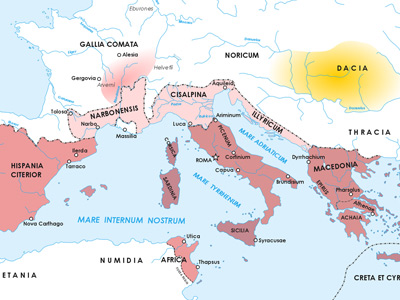Great Roman Civil War (49–45 BC)
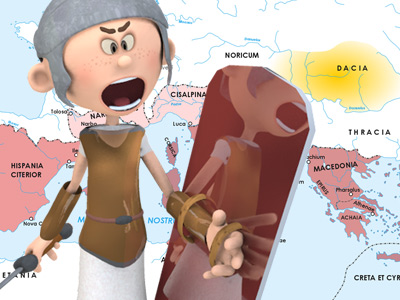
Pre-war Politico–military Situation
Caesar's Civil War resulted from the long political subversion of the Roman Government's institutions, begun with the career of Tiberius Gracchus, continuing with the Marian reforms of the legions, the bloody dictatorship of Lucius Cornelius Sulla, and completed by the First Triumvirate over Rome.
The First Triumvirate (so denominated by Cicero), comprising Julius Caesar, Crassus, and Pompey, ascended to power with Caesar's election as consul, in 59 BC. The First Triumvirate was unofficial, a political alliance the substance of which was Pompey's military might, Caesar's political influence, and Crassus' money. The alliance was further consolidated by Pompey's marriage to Julia, daughter of Caesar, in 59 BC. At the conclusion of Caesar's first consulship, the Senate (rather than granting him a provincial governorship) tasked him with watching over the Roman forests. This job, specially created by his Senate enemies, was meant to occupy him without giving him command of armies, or garnering him wealth and fame.
Caesar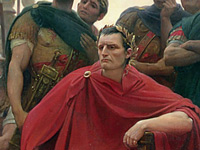 Julius Caesar (100-44 BC), was a Roman politician and general who played a critical role in the events that led to the demise of the Roman Republic and the rise of the Roman Empire. Caesar is considered by many historians to be one of the greatest military commanders in history. Julius Caesar » with the help of Pompey and Crassus, evaded the Senate's decrees by legislation passed through the popular assemblies. By these acts, Caesar was promoted to Roman Governor of Illyricum and Cisalpine Gaul. Transalpine Gaul (southern France) was added later. The various governorships gave Caesar command of an army of (initially) four legions. The term of his proconsulship, and thus his immunity from prosecution, was set at five years, rather than the customary one year. His term was later extended by another five years. During this ten-year period, Caesar used his military forces to conquer Gaul and invade Britain, without explicit authorisation by the Senate.
Julius Caesar (100-44 BC), was a Roman politician and general who played a critical role in the events that led to the demise of the Roman Republic and the rise of the Roman Empire. Caesar is considered by many historians to be one of the greatest military commanders in history. Julius Caesar » with the help of Pompey and Crassus, evaded the Senate's decrees by legislation passed through the popular assemblies. By these acts, Caesar was promoted to Roman Governor of Illyricum and Cisalpine Gaul. Transalpine Gaul (southern France) was added later. The various governorships gave Caesar command of an army of (initially) four legions. The term of his proconsulship, and thus his immunity from prosecution, was set at five years, rather than the customary one year. His term was later extended by another five years. During this ten-year period, Caesar used his military forces to conquer Gaul and invade Britain, without explicit authorisation by the Senate.
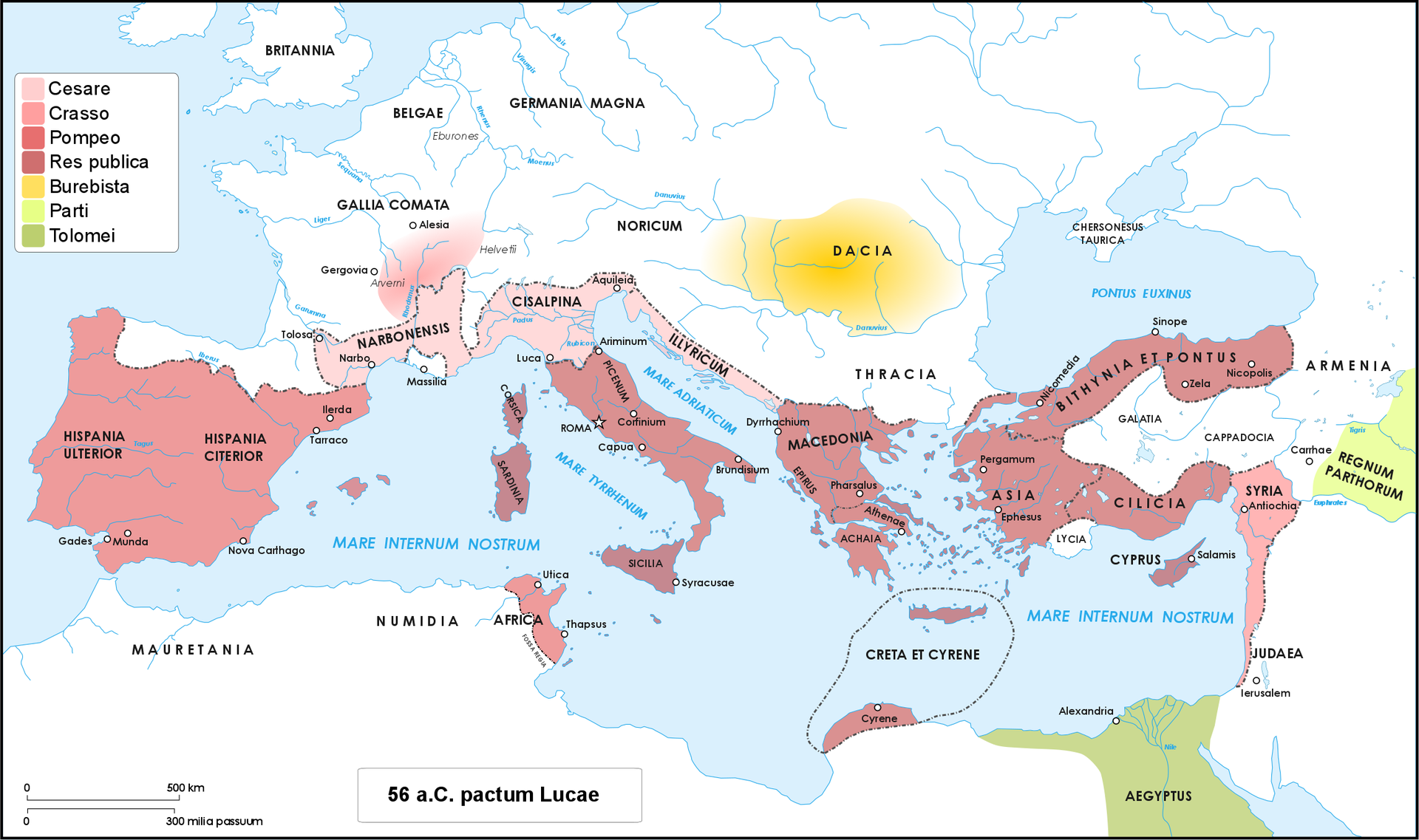
Roman world in 56 BC, when Caesar, Crassus and Pompey meet at Luca for a conference in which they decided: to add another five years to the proconsulship of Caesar in Gaul; to give the province of Syria to Crassus and both Spains and Africa to Pompey

Roman world in 56 BC, when Caesar, Crassus and Pompey meet at Luca for a conference in which they decided: to add another five years to the proconsulship of Caesar in Gaul; to give the province of Syria to Crassus and both Spains and Africa to Pompey.
( Click image to enlarge)
In 52 BC, at the First Triumvirate's end, the Roman The Roman Republic was a form of government of Rome and the era of the classical Roman civilization when it was run through public representation of the Roman people. Beginning with the overthrow of the Roman Kingdom (traditionally dated to 509 BC) and ending in 27 BC with the establishment of the Roman Empire, Rome's control rapidly expanded during this period - from the city's immediate surroundings to hegemony over the entire Mediterranean world. Senate supported Pompey as sole consul; meanwhile, Caesar had become a military hero and champion of the people. Knowing he hoped to become consul when his governorship expired, the Senate, politically fearful of him, ordered he resign command of his army. In December of 50 BC, Caesar wrote to the Senate agreeing to resign his military command if Pompey followed suit. Offended, the Senate demanded he immediately disband his army, or be declared an enemy of the people: an illegal political bill, for he was entitled to keep his army until his term expired.
The Roman Republic was a form of government of Rome and the era of the classical Roman civilization when it was run through public representation of the Roman people. Beginning with the overthrow of the Roman Kingdom (traditionally dated to 509 BC) and ending in 27 BC with the establishment of the Roman Empire, Rome's control rapidly expanded during this period - from the city's immediate surroundings to hegemony over the entire Mediterranean world. Senate supported Pompey as sole consul; meanwhile, Caesar had become a military hero and champion of the people. Knowing he hoped to become consul when his governorship expired, the Senate, politically fearful of him, ordered he resign command of his army. In December of 50 BC, Caesar wrote to the Senate agreeing to resign his military command if Pompey followed suit. Offended, the Senate demanded he immediately disband his army, or be declared an enemy of the people: an illegal political bill, for he was entitled to keep his army until his term expired.
A secondary reason for Caesar's immediate want for another consulship was delaying the inevitable senatorial prosecutions awaiting him upon retirement as governor of Illyricum and Gaul. These potential prosecutions were based upon alleged irregularities that occurred in his consulship and war crimes committed in his Gallic campaigns. Moreover, Caesar loyalists, the tribunes Mark Antony and Quintus Cassius Longinus, vetoed the bill, and were quickly expelled from the Senate. They then joined Caesar, who had assembled his army, whom he asked for military support against the Senate; agreeing, his army called for action.
In 50 BC, at his Proconsular term's expiry, the Pompey-led Senate ordered Caesar's return to Rome and the disbanding of his army, and forbade his standing for election in absentia for a second consulship; because of that, Caesar thought he would be prosecuted and rendered politically marginal if he entered Rome without consular immunity or his army; to wit, Pompey accused him of insubordination and treason.
HISTORY
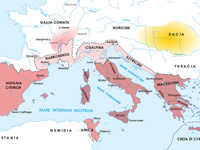
RESOURCES
This article uses material from the Wikipedia article "Caesar's Civil War", which is released under the Creative Commons Attribution-Share-Alike License 3.0.
© Stories Preschool. All Rights Reserved.
